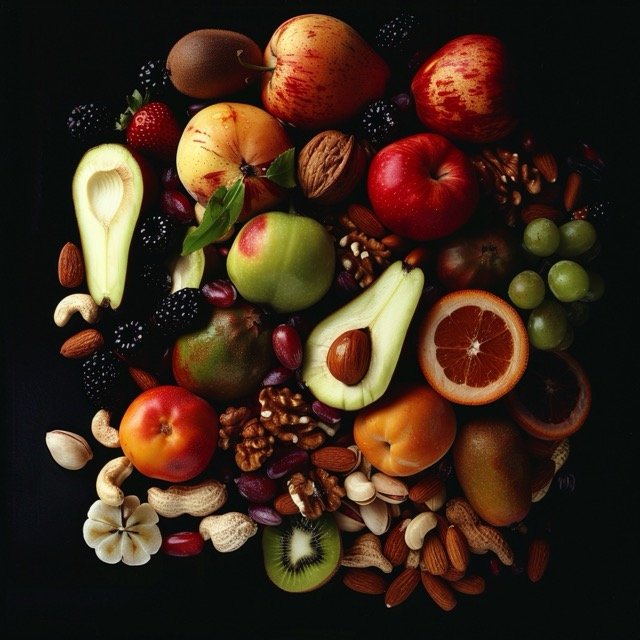The Mediterranean Diet: The Key to a Longer, Healthier Life!
The Mediterranean Diet is more than just a diet; it’s a lifestyle inspired by the traditional eating habits of people living in countries bordering the Mediterranean Sea.
Renowned for its health benefits, the Mediterranean Diet has been linked to a lower risk of heart disease, certain cancers, diabetes, and even Alzheimer’s disease.
This diet emphasizes whole foods, healthy fats, and lean proteins, making it an excellent choice for those seeking to improve their overall health and well-being.
Key Components of the Mediterranean Diet

1. Emphasis on Whole Foods
The Mediterranean Diet prioritizes whole, minimally processed foods. This includes:
- Fruits and Vegetables: A variety of colorful fruits and vegetables are consumed daily. Examples include tomatoes, cucumbers, spinach, and oranges.
- Whole Grains: Foods like whole wheat bread, brown rice, and quinoa are staples.
- Legumes and Nuts: Beans, lentils, chickpeas, almonds, and walnuts are important sources of plant-based protein and fiber.
Studies have shown that diets rich in whole foods are associated with a lower risk of chronic diseases and better overall health outcomes.
2. Healthy Fats
Unlike many diets that limit fat intake, the Mediterranean Diet includes healthy fats, particularly from olive oil. Olive oil is rich in monounsaturated fats, which can help reduce bad cholesterol levels and lower the risk of heart disease. Other sources of healthy fats include:
- Avocados
- Nuts and Seeds
- Fatty Fish: Salmon, mackerel, and sardines are high in omega-3 fatty acids, which have been shown to support heart health and reduce inflammation.
A study published in the New England Journal of Medicine found that individuals following a Mediterranean Diet supplemented with extra-virgin olive oil or nuts had a 30% reduced risk of major cardiovascular events compared to those on a low-fat diet .
3. Moderate Consumption of Dairy and Protein
The Mediterranean Diet includes moderate amounts of dairy, primarily in the form of cheese and yogurt. Lean proteins, such as poultry, fish, and legumes, are preferred over red meat, which is consumed less frequently. This approach helps in maintaining a balanced intake of essential nutrients while avoiding excessive saturated fats.
4. Limited Red Meat and Sweets
Red meat is consumed sparingly, often no more than a few times a month. Sweets and desserts are also limited, typically reserved for special occasions. This helps reduce the intake of unhealthy fats and added sugars, contributing to better metabolic health.
Health Benefits of the Mediterranean Diet

1. Heart Health
The Mediterranean Diet is consistently associated with improved heart health. The combination of healthy fats, whole grains, and abundant fruits and vegetables helps maintain healthy cholesterol levels and reduce the risk of heart disease. A meta-analysis of observational studies and randomized controlled trials concluded that adherence to the Mediterranean Diet significantly reduces the risk of cardiovascular mortality.
2. Weight Management
While not specifically a weight loss diet, the Mediterranean Diet’s focus on nutrient-dense foods can naturally lead to weight loss and better weight management. The diet’s high fiber content from fruits, vegetables, and whole grains helps keep you full longer, reducing overall calorie intake.
3. Reduced Risk of Chronic Diseases
Research has shown that the Mediterranean Diet can reduce the risk of several chronic diseases, including type 2 diabetes, certain cancers, and neurodegenerative diseases like Alzheimer’s. A study published in the British Journal of Nutrition found that higher adherence to the Mediterranean Diet was associated with a 33% lower risk of developing type 2 diabetes .
4. Improved Longevity
The Mediterranean Diet is linked to increased longevity. The combination of nutrient-rich foods, healthy fats, and an active lifestyle contributes to a lower risk of mortality from various causes. The diet’s anti-inflammatory properties are believed to play a significant role in promoting long-term health and longevity.
Practical Examples and Tips

Breakfast
- Greek Yogurt with Berries and Honey: A simple and nutritious start to the day, rich in protein and antioxidants.
- Whole Grain Toast with Avocado and a Poached Egg: Provides healthy fats and protein to keep you energized.
Lunch
- Quinoa Salad with Mixed Vegetables and Chickpeas: A light and filling meal packed with fiber and plant-based protein.
- Grilled Chicken Wrap with Fresh Vegetables: A balanced meal that is easy to prepare and customize.
Dinner
- Baked Salmon with Steamed Asparagus and Brown Rice: A heart-healthy dinner rich in omega-3 fatty acids and essential nutrients.
- Vegetable Stir-Fry with Tofu and Whole Grain Noodles: A vegetarian option that is both satisfying and nutrient-dense.
Snacks

- A Handful of Nuts and Fresh Fruit: A quick and healthy option to keep hunger at bay.
- Hummus with Carrot and Cucumber Sticks: A tasty and fiber-rich snack.
Conclusion
The Mediterranean Diet is a sustainable and enjoyable way to improve your overall health. Its emphasis on whole foods, healthy fats, and lean proteins makes it a balanced and nutritious choice for anyone looking to enhance their well-being. The scientific evidence supporting the Mediterranean Diet’s health benefits is robust, highlighting its potential to reduce the risk of chronic diseases and promote longevity.
For those interested in exploring the Mediterranean Diet further, consider starting with small changes, such as incorporating more fruits and vegetables into your meals, choosing whole grains, and using olive oil as your primary fat source. As you become more comfortable with the principles of the diet, you can gradually adopt more aspects into your daily routine.
Further Reading
- “The Complete Mediterranean Cookbook” by America’s Test Kitchen
- “The Mediterranean Diet for Beginners” by Rockridge Press
- Research articles and reviews in reputable journals like The New England Journal of Medicine and The British Journal of Nutrition.
By following the Mediterranean Diet, you can enjoy delicious meals while taking significant steps towards a healthier lifestyle. Also, read about the Valencia Diet, which is similar and very popular.







